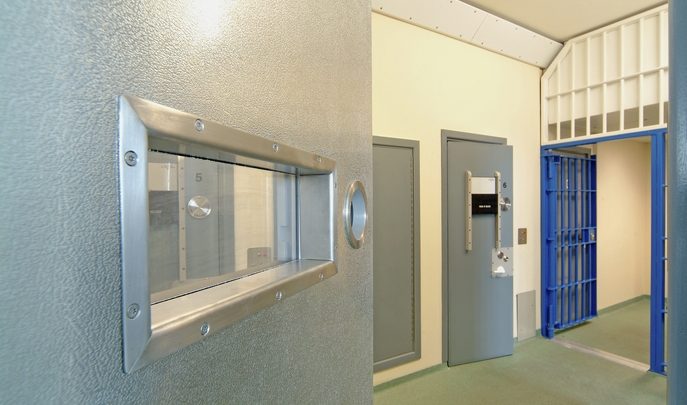Behind Locked Doors – How Can Schools Support Pupils With Parents In Prison?

Experiencing what it's like for young people to visit a parent in prison can help teachers support these vulnerable students in the classroom, says Gordon Cairns

- by Gordon Cairns
- English and forest school teacher

As an adult, this must be the last place you would ever want to visit; for a child visiting their dad here, the experience is unimaginable.
HMP Barlinnie, with its high, grey walls that dominate the suburbs of the eastern edge of Glasgow, is home to 1,400 inmates, some of whom have committed horrific crimes which would have been splashed across the headlines of newspapers of the time. It is also home to fathers, uncles and brothers.
Incredibly, more than double the number of children are affected by a close family member being imprisoned than by their parents divorcing in the UK today. And although there are no official figures, it has been estimated that approximately a quarter of a million children have a parent in prison in this country.
The 30 teachers left waiting half an hour in the darkly claustrophobic waiting room are in this prison to experience a visit as felt by one of their own pupils, and the delay is simply to replicate the time the children generally have to wait around here before they can go in to see their father. Most of us are lucky as we have either driven here or live in the west of Scotland, but many of the families visiting won’t have access to a car and may have taken innumerable buses to reach this difficult to access part of the city.
Harsh reality
This unique CPD has been arranged by Families Outside, an organisation that supports families where a member has been incarcerated. The purpose of the training is to give teachers an awareness of the impact of parental imprisonment, and how this might have repercussions in the classroom and to a child’s education. Over 1000 teachers in Scotland have undergone the training and visits have occurred in almost every prison in Scotland in the three years since the programme began.
‘In effect, going into prison allows teachers to walk in their pupils’ shoes and can let them experience it from the children’s perspective,’ explains Tim Haines, the family support manager for children and young people at the charity. ‘A parent’s imprisonment can have an effect on a child all around the school and it’s about having an awareness of that.’
Eventually the tour begins. As we go through the first of many heavy steel doors, a small black sniffer dog inspects us for drugs. Young children may have to experience this as they come into the establishment, in case something has been hidden in their clothes. They might possibly witness the dog finding contraband on their mum, resulting in a closed visit – undertaken where inmate and child are separated by glass.
We head up to the visiting area and I lose count of the number of steel doors which have to be unlocked and then locked after we have all passed through and go into the first of two visiting areas. The visitors have to undergo both a ‘rub down’ and ‘open mouth’ search at this point, whilst the children’s toys undergo a search.
It is only at this point that the family is allowed to see the prisoner, who must remain seated in a green chair throughout the visit – the blue chairs are for visitors – all under the watchful eye of guards and CCTV cameras.
Relationships matter
As uncomfortable as the experience may be, these visits are incredibly important in maintaining a link between parent and child, as well as in the rehabilitation of the prisoner. The most recent official estimates in the UK indicate that strong family ties can reduce the likelihood of someone reoffending by 39%; but it is also true that children of prisoners have about three times the risk of mental health problems and/or anti-social behaviour compared to their peers.
The message that Families Outside want us to take away from the visit is that communication and honesty are of paramount importance, as children who are not told a parent is in prison are more likely to struggle with that absence than those who are informed.
On the flip side, schools often don’t understand why a pupil’s behaviour may suddenly deteriorate as at present, education authorities in the UK are not automatically told a child’s parent is inside. Young people who were interviewed for a recent report said that it helped that a teacher knew that their mum or dad was in prison as they could then confide in a trusted adult.
‘A big part of what we are trying to do is give teachers confidence to reach out to children and their families knowing they have the ability to talk about this subject in a sensitive way, so that it’s not the elephant in the room,’ says Mr Haines. ‘It is much better that the subject is talked about openly, and to facilitate discussion by focusing on relationships – mum is mum and dad is dad – rather than the offence the person has committed.’
Although it is difficult to quantify the success of the scheme, Haines reports that anecdotally, teachers are helping create closer links between school and prison. ‘A teenage boy had seen a poster about our services and contacted us,’ he adds. ‘His dad, who was in prison, had been an important figure in the boy’s education and now he was going through a difficult time in school.
‘We managed to arrange a video conference call through the school, and this had a major impact on his studies and his future educational decisions. Knowing that dad was involved had a positive influence on all of that.’
Although Families Outside only operates within Scotland, other organisations can offer support in the rest of the United Kingdom. For example, children’s charity Barnardo’s, which through a Freedom of Information request discovered that 500,000 visits were made to prison by children in England and Wales in 2013, runs 13 specialist services in prisons and communities across England and Wales to support children. Action for Prisoners’ and Offenders’ Families (part of Family Lives) supports professionals to be more effective by providing expertly tailored information about news and training, and producing specialist events and resources.
Advice for teachers who has a pupil with a parent in prison
• In the UK there is no process which will inform a school if a pupil has a parent in prison; you might therefore not initially know why a young person has suddenly become more withdrawn, why their life might have become more chaotic and why they come into class looking exhausted.
• If a student confides that a parent has been imprisoned, keep the information to a need to know basis, as shame could be a major element of their distress – but talk openly to the child about the situation.
• Be understanding if the young person is tired or homework isn’t returned in time. They might have spent a long time travelling to visit their parent the night before.
• Children can be an important part of a parent’s rehabilitation, and just because someone is imprisoned, it doesn’t mean they lose interest in their offspring. Keep them in the loop; is it possible to send report cards to the parent in prison, or can a Skype link be established?
• Schools can also help by being flexible if a child needs to leave school early to visit a parent in prison; maintaining the parental bond can be just as important as academic achievement.
• Children might just want a trusted adult to be a non-judgemental listener who is outside of the family dynamic.
Gordon Cairns is an English and forest school teacher, who works in a unit for secondary pupils on the Autism Spectrum Disorder. He also writes about education, society, cycling and football for a number of publications.










